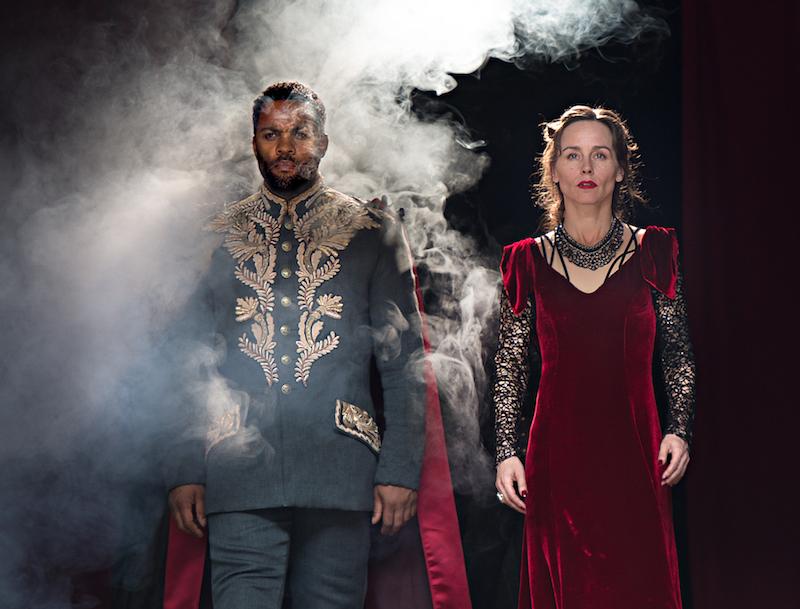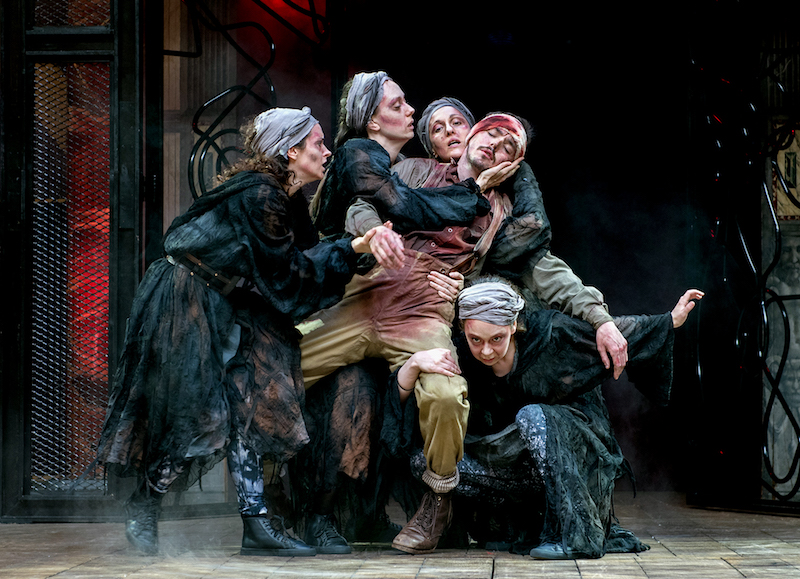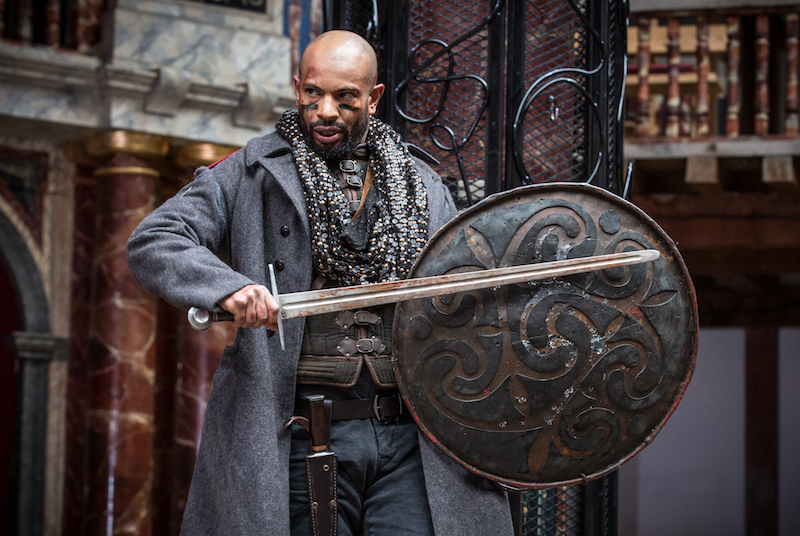Macbeth, Shakespeare's Globe | reviews, news & interviews
Macbeth, Shakespeare's Globe
Macbeth, Shakespeare's Globe
Incoherent vision results in a (Mac)duff production

It begins promisingly, a dark Gothic fairy tale – both Grimm and grim. The writhing witches (four, oddly) are summoned from a pile of dead bodies, Stefan Fichert’s eerie puppetry all chopped-up limbs and interchanging demonic heads, hands scuttling across the floor like a spider, and disembodied voices chanting and haunting. Then the spell is broken and “what seem’d corporal melted”.
Unfortunately, that’s also when the air goes out of Iqbal Khan’s lacklustre production, which plods along from one incident to the next without any clear intent. Ray Fearon’s Macbeth is a mellifluous speaker, massaging every syllable of the poetry, but lacks convincing psychological underpinning – he simply acts because the text demands it. As his wife, Tara Fitzgerald is in another version altogether: where he is lofty and declamatory, she is sardonic, naturalistic and too soft-spoken; he rages at the heavens while she gets amusingly tipsy and casually conceals their crimes. It’s a bizarre arranged marriage of wildly contrasting performances, and vague attempts to sex up their relationship fall flat.
 Neither is noticeably driven by ambition or thirst for power, nor damaged by past tragedy. A tiny tot trots adorably around the stage, representing their lost child, but to no particular end. It’s simultaneously soap-operatic broad – at one point Lady Macbeth throws a drink in her husband’s face – and not bold enough. The nightmarish, otherworldly quality is absent for too long, so that brief reprises, like the summoning of Banquo in a visually interesting riff on “The Tell-Tale Heart”, wind up clashing with an otherwise straightforward rendering. (The witches pictured above)
Neither is noticeably driven by ambition or thirst for power, nor damaged by past tragedy. A tiny tot trots adorably around the stage, representing their lost child, but to no particular end. It’s simultaneously soap-operatic broad – at one point Lady Macbeth throws a drink in her husband’s face – and not bold enough. The nightmarish, otherworldly quality is absent for too long, so that brief reprises, like the summoning of Banquo in a visually interesting riff on “The Tell-Tale Heart”, wind up clashing with an otherwise straightforward rendering. (The witches pictured above)
There are surer supporting performances, with Jermaine Dominique (pictured below by Marc Brenner) a notably charismatic Banquo. He’s a pumped-up warrior, spitting water at the groundlings and banging his shield, and a devoted father, but more visibly seduced by promises of greatness than Fearon’s Macbeth. He puts up a real fight when the assassins come to call, and his absence is sorely felt. Sam Cox transforms the often dull Duncan into a grand, preening luvvie, exceedingly aware that power is a performance, Kerry Gooderson sharply defines the young Fleance and sassy Macduff child, and Jacob Fortune-Lloyd enlivens the second half as a committed Macduff, poleaxed by the news that his family has been slaughtered.
 But the standout performance is Nadia Albina as a stand-up comic Porter. She emerges from a sleeping bag, torn fishnets hanging off one foot, and weaves contemporary references into her rants, from the inevitable “To remain or not to remain?” (a joke that rings horribly hollow now) to the naming of Trump as a devil and – winning the hearts of commuters – “Welcome to Hell: mind the gap.” She’s eccentric and licentious, but also shrewd and quick-witted. There’s method to her madness.
But the standout performance is Nadia Albina as a stand-up comic Porter. She emerges from a sleeping bag, torn fishnets hanging off one foot, and weaves contemporary references into her rants, from the inevitable “To remain or not to remain?” (a joke that rings horribly hollow now) to the naming of Trump as a devil and – winning the hearts of commuters – “Welcome to Hell: mind the gap.” She’s eccentric and licentious, but also shrewd and quick-witted. There’s method to her madness.
In contrast, the drawn-out violence just seems needlessly sadistic, and there’s too much focus on elaborate corpse disposal. Melanie Pappenheim’s singing is evocative, but combined with Joan O’Clery’s velvet costuming, Ciaran Bagnhall's twirly wrought iron, and copious dry ice, it feels like a particularly languorous Eighties music video. Too often, the action is jarringly or even unintentionally funny. One of the more disappointingly conservative offerings in Emma Rice’s new season, but lacking the old-school Globe continuous engagement.
rating
Explore topics
Share this article
The future of Arts Journalism
You can stop theartsdesk.com closing!
We urgently need financing to survive. Our fundraising drive has thus far raised £49,000 but we need to reach £100,000 or we will be forced to close. Please contribute here: https://gofund.me/c3f6033d
And if you can forward this information to anyone who might assist, we’d be grateful.

Subscribe to theartsdesk.com
Thank you for continuing to read our work on theartsdesk.com. For unlimited access to every article in its entirety, including our archive of more than 15,000 pieces, we're asking for £5 per month or £40 per year. We feel it's a very good deal, and hope you do too.
To take a subscription now simply click here.
And if you're looking for that extra gift for a friend or family member, why not treat them to a theartsdesk.com gift subscription?
more Theatre
 Joyceana around Bloomsday, Dublin review - flawless adaptations of great dramatic writing
Chapters and scenes from 'Ulysses', 'Dubliners' and a children’s story vividly done
Joyceana around Bloomsday, Dublin review - flawless adaptations of great dramatic writing
Chapters and scenes from 'Ulysses', 'Dubliners' and a children’s story vividly done
 Stereophonic, Duke of York's Theatre review - rich slice of creative life delivered by a 1970s rock band
David Adjmi's clever and compelling hit play gets a crack London cast
Stereophonic, Duke of York's Theatre review - rich slice of creative life delivered by a 1970s rock band
David Adjmi's clever and compelling hit play gets a crack London cast
 North by Northwest, Alexandra Palace review - Hitchcock adaptation fails to fly
Emma Rice's storytelling at fault in misconceived production
North by Northwest, Alexandra Palace review - Hitchcock adaptation fails to fly
Emma Rice's storytelling at fault in misconceived production
 Hamlet Hail to the Thief, RSC, Stratford review - Radiohead mark the Bard's card
An innovative take on a familiar play succeeds far more often than it fails
Hamlet Hail to the Thief, RSC, Stratford review - Radiohead mark the Bard's card
An innovative take on a familiar play succeeds far more often than it fails
 The King of Pangea, King's Head Theatre review - grief and hope, but no connection
Heart and soul proves insufficient in world premiere of therapeutic show
The King of Pangea, King's Head Theatre review - grief and hope, but no connection
Heart and soul proves insufficient in world premiere of therapeutic show
 A Midsummer Night's Dream, Bridge Theatre review - Nick Hytner's hit gender-bender returns refreshed
This Dream is a great night out, especially for Shakespeare first-timers
A Midsummer Night's Dream, Bridge Theatre review - Nick Hytner's hit gender-bender returns refreshed
This Dream is a great night out, especially for Shakespeare first-timers
 Miss Myrtle’s Garden, Bush Theatre review - flowering talent, but needs weeding
New play about loss, love, grief and gardening is humane, but flawed
Miss Myrtle’s Garden, Bush Theatre review - flowering talent, but needs weeding
New play about loss, love, grief and gardening is humane, but flawed
 Fiddler on the Roof, Barbican review - lean, muscular delivery ensures that every emotion rings true
This transfer from Regent's Park Open Air Theatre sustains its magic
Fiddler on the Roof, Barbican review - lean, muscular delivery ensures that every emotion rings true
This transfer from Regent's Park Open Air Theatre sustains its magic
 In Praise of Love, Orange Tree Theatre review - subdued production of Rattigan's study of loving concealment
Unspoken emotion flows through this late work
In Praise of Love, Orange Tree Theatre review - subdued production of Rattigan's study of loving concealment
Unspoken emotion flows through this late work
 Letters from Max, Hampstead Theatre review - inventively staged tale of two friends fighting loss with poetry
Sarah Ruhl turns her bond with a student into a lesson in how to love
Letters from Max, Hampstead Theatre review - inventively staged tale of two friends fighting loss with poetry
Sarah Ruhl turns her bond with a student into a lesson in how to love
 Elephant, Menier Chocolate Factory review - subtle, humorous exploration of racial identity and music
Story of self-discovery through playing the piano resounds in Anoushka Lucas's solo show
Elephant, Menier Chocolate Factory review - subtle, humorous exploration of racial identity and music
Story of self-discovery through playing the piano resounds in Anoushka Lucas's solo show
 This is My Family, Southwark Playhouse - London debut of 2013 Sheffield hit is feeling its age
Relatable or stereotyped - that's for you to decide
This is My Family, Southwark Playhouse - London debut of 2013 Sheffield hit is feeling its age
Relatable or stereotyped - that's for you to decide

Add comment